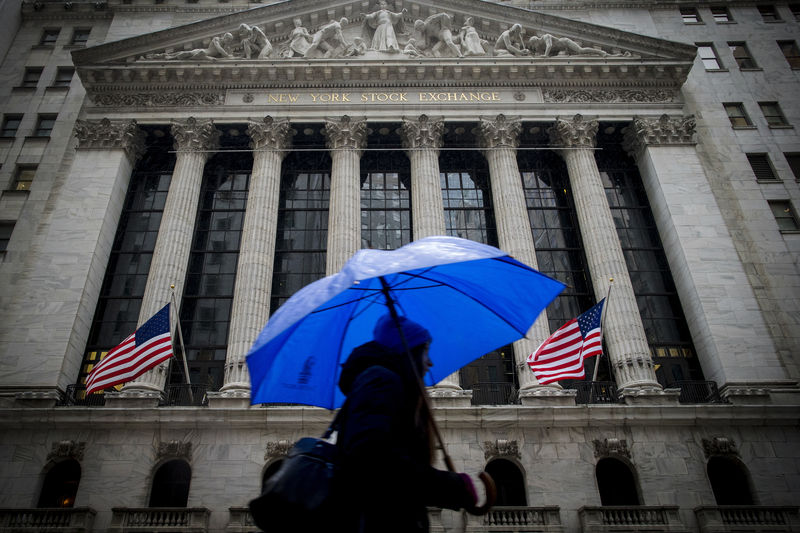Investing.com — U.S. stock futures slump after fresh violence over the weekend between Israel and Hamas. The conflict’s geopolitical ramifications spark a jump in oil prices, adding to concerns over inflationary pressures as crucial U.S. consumer price data looms later in the week. Elsewhere, activist investor Nelson Peltz reportedly plans a push for board seats at Walt Disney (NYSE:), while Citigroup (NYSE:) agrees to sell its mainland Chinese consumer wealth unit to HSBC Holdings (LON:).
1. U.S. futures point lower amid Israel, Hamas conflict
U.S. stock futures moved lower on Monday as investors gauged the impact of the intensifying conflict between Israel and Hamas and looked ahead to fresh inflation data later this week.
At 04:51 ET (08:51 GMT), the contract had lost 197 points or 0.6%, shed 28 points or 0.7%, and fell by 107 points or 0.7%.
The Israeli-Palestinian conflict escalated to full-blown war over the weekend, as members of the Islamist group Hamas attacked several Israeli towns, killing hundreds of Israelis and abducting dozens more. In response, Israeli air strikes pounded numerous targets in Gaza, resulting in numerous casualties.
Markets were already in a fragile state as traders contended with twin worries over inflation and elevated interest rates. Data last week showed a stronger-than-expected surge in the number of jobs added by the American economy during the month, heaping on to these concerns.
Officials at the Federal Reserve will have more crucial data to consider on Thursday, when the latest are set to be released. Heading into the numbers, the probability that the central bank will keep interest rates steady at its upcoming policy meeting next month stands at just over 76%, according to Investing.com’s .
The tensions have also soured sentiment ahead of a raft of bank earnings in the coming days that typically kick off the quarterly parade of corporate financial results.
2. Middle East violence boosts U.S. dollar’s safe haven status; shekel slides
The U.S. dollar climbed, with traders shying away from riskier assets for the relative safety of the greenback following clashes between forces from Israel and Palestinian group Hamas.
By 04:51 ET, the , which tracks the currency against a basket of its peers, had risen by 0.4% to 106.49. It was further bolstered by bets that, despite muted wage growth, the tight labor market picture could be foreshadowing a hotter-than-anticipated inflation print later this week.
In the wake of the outbreak of the violence, the slumped to its weakest level against the dollar since 2016. This prompted the central Bank of Israel to announce that it would sell up to $30 billion in foreign currency to help stabilize the shekel.
The bank pledged in a statement to “operate in the market during the coming period” to moderate volatility in the shekel exchange rate and provide liquidity for the “continued proper functioning of the markets.”
3. Oil prices soar
Oil prices soared, rebounding from a drop last week, as the conflict between Israel and Hamas deepened political uncertainty in the Middle East and exacerbated supply fears.
At 04:52 ET, the futures traded 3.0% higher at $85.31 a barrel, while the contract climbed 2.8% to $86.95 per barrel.
Last week saw oil prices post their steepest weekly losses since March, with Brent falling by about 11% and WTI recording an over 8% dip, on worries that persistently high interest rates will slow global growth and hammer fuel demand.
Although neither Israel nor Palestine are major players in the global energy market, the violence could have subsequent effects on the geopolitical strategies of key crude producers in the Middle East. Supply is already under some strain from a decision by Saudi Arabia and Russia to extend output reductions until the end of 2023.
The jump in oil has fueled concerns over a prolonged crude rally that may give renewed vigor to inflationary pressures, which could force central banks around the world to leave borrowing costs higher for a longer period of time.
4. Nelson Peltz planning push for Disney board seats – WSJ
Nelson Peltz’s Trian Fund Management is expected to request multiple seats on the board of Walt Disney, according to the Wall Street Journal.
Citing people familiar with the matter, the newspaper said that Trian, who owns around a $2.5 billion stake in the group, will ask that one of those seats be reserved for Peltz.
Trian may nominate possible directors that would be voted on at an annual meeting next year should Disney refuse, the WSJ noted.
Shares in the entertainment giant have slumped by over 6% so far this year despite a short-lived rise in the stock in February after the unveiling of a sweeping restructuring plan.
5. Citi to sell China wealth management portfolio to HSBC
Citigroup has agreed to sell its retail wealth management portfolio in mainland China to HSBC, the lenders said in statements on Monday.
The transaction, which will cover total deposits and investment assets under management of around $3.6 billion across 11 large Chinese cities, is expected to close in the first half of 2024.
Citi had previously announced plans to divest its retail operations in several Asian countries. The U.S.-based bank is aiming to offload its Indonesia consumer business later this year, it added.
For Asia-focused HSBC, the move will expand its presence in China at a time when the company is looking to the world’s second-biggest economy to help drive revenues.
Read the full article here











Leave a Reply